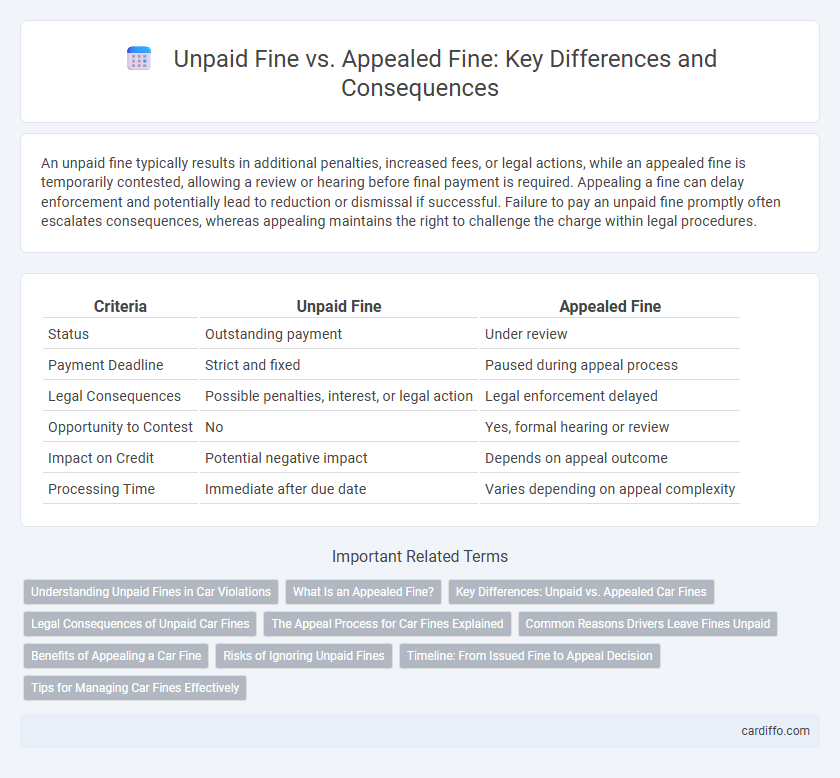An unpaid fine typically results in additional penalties, increased fees, or legal actions, while an appealed fine is temporarily contested, allowing a review or hearing before final payment is required. Appealing a fine can delay enforcement and potentially lead to reduction or dismissal if successful. Failure to pay an unpaid fine promptly often escalates consequences, whereas appealing maintains the right to challenge the charge within legal procedures.
Table of Comparison
| Criteria | Unpaid Fine | Appealed Fine |
|---|---|---|
| Status | Outstanding payment | Under review |
| Payment Deadline | Strict and fixed | Paused during appeal process |
| Legal Consequences | Possible penalties, interest, or legal action | Legal enforcement delayed |
| Opportunity to Contest | No | Yes, formal hearing or review |
| Impact on Credit | Potential negative impact | Depends on appeal outcome |
| Processing Time | Immediate after due date | Varies depending on appeal complexity |
Understanding Unpaid Fines in Car Violations
Unpaid fines in car violations often lead to increased penalties, such as additional fees, license suspension, or vehicle registration holds, emphasizing the importance of timely payment. In contrast, appealed fines involve disputing the violation through legal or administrative channels, which can delay payment obligations and potentially reduce or eliminate the fine if the appeal is successful. Understanding the consequences of unpaid fines versus the process and benefits of appealing helps vehicle owners manage their legal and financial responsibilities more effectively.
What Is an Appealed Fine?
An appealed fine is a financial penalty contested by the individual or entity through a formal legal or administrative process, seeking to reduce or dismiss the charge. Unlike an unpaid fine, which remains delinquent and may incur additional fees or legal consequences, an appealed fine temporarily suspends payment obligations until the review concludes. This distinction is crucial for managing penalties related to traffic violations, municipal codes, or regulatory infractions.
Key Differences: Unpaid vs. Appealed Car Fines
Unpaid car fines remain outstanding and may result in additional penalties, such as increased fees or legal action, whereas appealed fines are actively contested by the vehicle owner through a formal dispute process. The key difference lies in the legal status: unpaid fines indicate non-compliance, while appealed fines signify an ongoing review aimed at potentially overturning the original penalty. Authorities often suspend enforcement actions temporarily during the appeal, but unpaid fines continue accumulating consequences until resolved.
Legal Consequences of Unpaid Car Fines
Unpaid car fines can lead to serious legal consequences such as vehicle registration suspension, additional late fees, and potential arrest warrants depending on jurisdiction. Courts may impose liens on property, and unpaid fines can negatively affect credit scores, resulting in long-term financial damage. Appealing fines offers a legal opportunity to contest charges, potentially avoiding these penalties if successful within statutory deadlines.
The Appeal Process for Car Fines Explained
The appeal process for car fines allows drivers to contest penalties by submitting a formal appeal within a specified timeframe, often 14 to 30 days from the issuance date. Unlike unpaid fines that accumulate additional fees and legal consequences, appealed fines are reviewed by traffic authorities or courts to determine their validity based on evidence and circumstances. Successfully appealed fines can result in reduced penalties or dismissal, while unresolved appeals may lead to enforcement actions such as license suspension or increased fines.
Common Reasons Drivers Leave Fines Unpaid
Drivers often leave fines unpaid due to financial hardship, lack of awareness about the fine, or confusion over the appeals process. Misunderstanding the deadlines for payment or appeals and ineffective communication from authorities contribute to non-payment. Many drivers also believe that appealing will automatically suspend the fine, leading to delayed or missed payments.
Benefits of Appealing a Car Fine
Appealing a car fine can lead to reduced penalties or complete dismissal, saving significant costs associated with unpaid fines that accrue interest and late fees. Contesting a fine provides an opportunity to present evidence or mitigating circumstances, increasing the chance of a favorable outcome. Legal records remain cleaner when fines are successfully appealed, which benefits insurance rates and driving records.
Risks of Ignoring Unpaid Fines
Ignoring unpaid fines can result in escalating penalties, such as increased late fees, interest charges, and potential legal action that may affect credit scores or lead to wage garnishment. An appealed fine, when properly managed, places disputes on hold, preventing additional penalties while the case is reviewed. Failure to address unpaid fines promptly risks vehicle immobilization, license suspension, or property liens, severely impacting financial stability and legal standing.
Timeline: From Issued Fine to Appeal Decision
The timeline from an issued fine to the appeal decision typically spans 30 to 90 days, depending on the jurisdiction and administrative efficiency. Unpaid fines remain in enforcement status and may accrue additional penalties or interest during this period, whereas appealed fines enter a review process that temporarily suspends payment obligations. Timely submission of the appeal is critical to avoid escalation, with most authorities requiring appeals within 14 to 30 days from the fine issuance date.
Tips for Managing Car Fines Effectively
To manage unpaid and appealed car fines effectively, promptly verify the fine details and deadlines to avoid additional penalties. Submit appeals with clear evidence and follow formal procedures to increase the chances of a successful dispute. Utilize online payment platforms and set reminders to ensure timely resolution and prevent overdue charges.
Unpaid fine vs appealed fine Infographic

 cardiffo.com
cardiffo.com